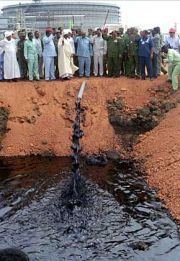FEATURE-Oil-hungry China takes Sudan under its wing
By David Blair, The Independent
KHARTOUM, Apr 23, 2005 — A metallic maze of chimneys, pipes and vents glitters on the horizon in the desert outside Khartoum, dominating the landscape for miles around.

|
|
Sudanese President Omar el-Bashir with ex-President Gaafar Nimeiri and Hassan Turabi among others during the inauguration of an oil pipeline on Monday May 31, 1999, in Heglig, central Sudan. (AP) . |
This new oil refinery is the jewel in the crown of Sudan’s military regime. It forms the vital artery of a thriving oil industry that poured £1 billion into government coffers last year.
Without this windfall gain – likely to be far larger this year – President Omar al-Bashir could not maintain his military machine, let alone wage war against rebels in the western region of Darfur. Nor could he hope to withstand the international pressure that his bloody campaign in Darfur has brought upon him.
Moreover, the oil that started to flow as recently as 1999 has given President Bashir an indispensable international ally.
Almost unnoticed by the outside world, China has become the key player in Sudan’s oil industry.
Beijing has invested £8 billion in Sudanese oil through the China National Petroleum Company (CNPC), a state-owned monolith. The cost of Khartoum’s new refinery alone was about £350 million.
Freshly painted billboards in Khartoum carry pictures of smiling Chinese oil workers and the slogan: “CNPC – Your close friend and faithful partner”. But this faithful friend is secretive about its stake in Africa’s largest country. China’s embassy in Khartoum and its commercial office declined to talk about oil.
A CNPC spokesman said: “We are a shareholder in a number of operating companies here. We conduct our operations through them. If you want to learn more, you must contact the mines and energy ministry.”
Yet CNPC’s annual report discloses that about half of all its overseas oil comes from Sudan. It deployed 10,000 Chinese workers to build a 900-mile pipeline, linking Heglig oilfield in Kordofan province with Port Sudan on the Red Sea.
The company’s report trumpets this achievement as its “first long-distance crude pipeline constructed and operated abroad”.
In fact, China shamelessly curried favour with Mr Bashir by speeding up this mammoth project so it could be finished in June 1999 – the tenth anniversary of the coup that brought him to power.
China is now dependent on Sudan for seven per cent of all its oil imports. Hence Beijing has gone to great efforts to shield Mr Bashir.
Last September, the United Nations Security Council passed resolution 1564, threatening Sudan with oil sanctions unless it curbed the violence in Darfur. But China immediately rendered this meaningless by pledging to veto any bid to impose an embargo.
Critics accuse China of being Sudan’s chief international protector.
“It’s very clear that’s what is happening,” said Georgette Gagnon, the deputy director of the Africa desk at Human Rights Watch.
“China is now the largest foreign investor in Sudan so it has an economic interest in ensuring that the Sudanese government is not penalised too harshly. It has been opposed to sanctions from day one.”
Beijing needs Sudan because its appetite for oil is insatiable.
China’s economic boom means that oil consumption is forecast to grow by at least 10 per cent every year for the foreseeable future. If so, China’s domestic reserves will be depleted in the next two decades.
So the quest for overseas oil is one of Beijing’s central goals. On Thursday China signed a “strategic partnership” with Nigeria, a major oil exporter, and has oil interests in at least three other African countries.
In its scramble for Africa, China portrays itself as a more benign partner than the colonial powers and the modern-day multinational companies.
President Hu Jintao told an Asia-Africa summit in Jakarta yesterday: “In pursuit of world peace and common development, China will always stand by, and work through thick and thin, with developing countries.” America has already snapped-up the world’s largest reserves. Saudi Arabia and Iraq – with 370 billion barrels between them, 45 per cent of the world’s total – are effectively closed to China.
Sudan, by contrast, is a no-go area for western oil companies. American investment was officially banned in 1997 and European multinationals steer clear of the avalanche of protest that would accompany any dealings with Mr al-Bashir’s regime. China, however, has no such scruples.
So far, Sudan has only 563 million barrels of proven reserves, but the energy ministry estimates that at least five billion barrels lie beneath its deserts.
Sudan’s few independent voices say this has brought disastrous consequences. “The crisis in Sudan is being fuelled by the issue of oil,” said William Ezekiel, editor of the Khartoum Monitor. “The government is ready to ally with Satan if it can protect its own interests.”
